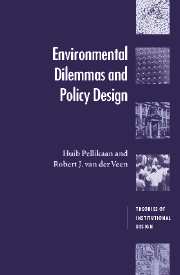Book contents
8 - Reported behaviour
Published online by Cambridge University Press: 22 September 2009
Summary
Determinants of behaviour
Economic growth in the nineties has led to increased consumption and more household chemical waste, rising energy consumption, and more traffic to holiday destinations. The Dutch government and its environmental advisory boards acknowledge the fact that the share of environmental pollution caused by consumers is rising. They also realize that traditional economic and legal tools for regulating the producers will not serve to change the behaviour of consumers, at the end of the chain. Given political mandate, government has the means of controlling the environmental behaviour of producers (at least in principle), while it has no firm grip on the actions of households (not even in principle). One reason that policymakers have found it difficult to influence the behaviour of consumers is that policy in the past was based on the standard Olson assumption that consumers react as a single group to environmental collective action problems, with a tendency to free ride.
Recent studies by the Netherlands Social and Cultural Planning Office (SCP) have shown that consumers cannot be addressed as a single group, and that they may sometimes be disposed to act cooperatively: ‘People will behave in an environmentally friendly way only if they are willing and able to do so.’ The willingness and ability of consumers to cooperate is subject to a large variety of conditions.
- Type
- Chapter
- Information
- Environmental Dilemmas and Policy Design , pp. 136 - 148Publisher: Cambridge University PressPrint publication year: 2002

